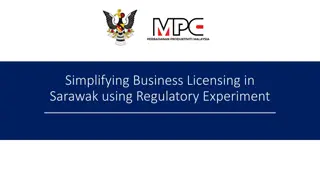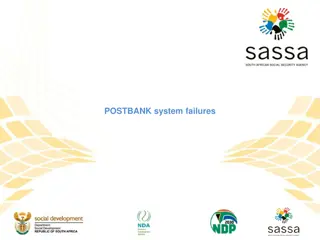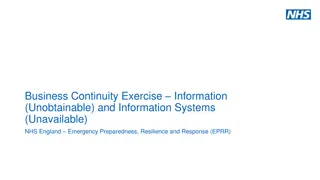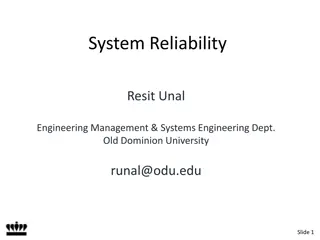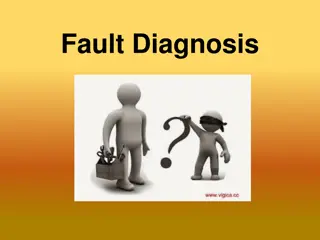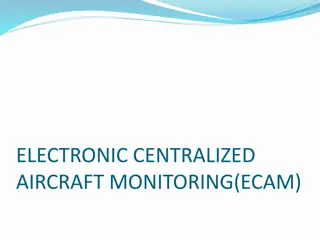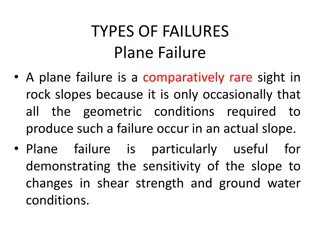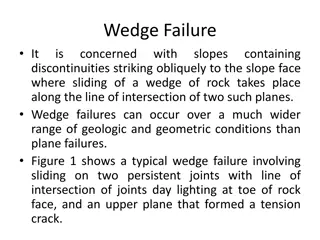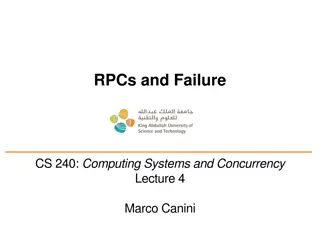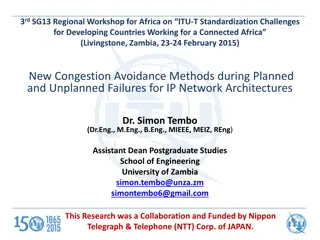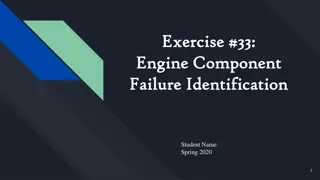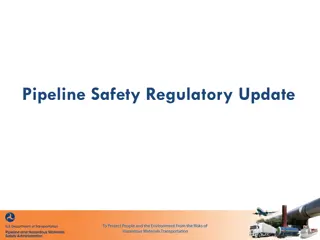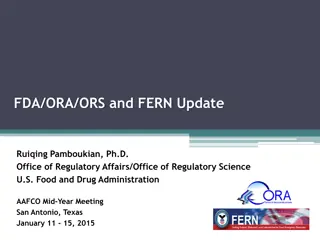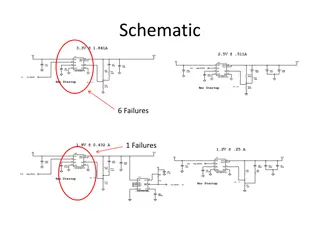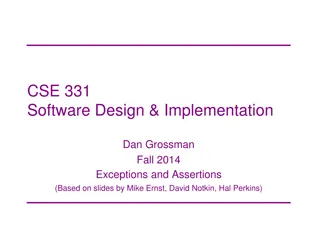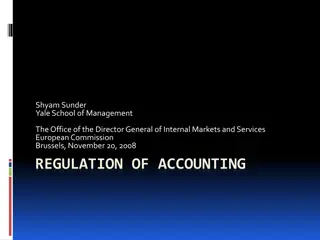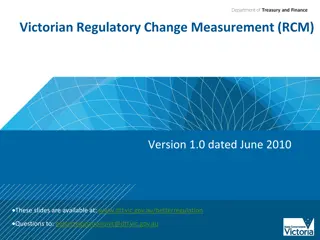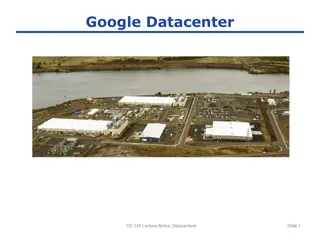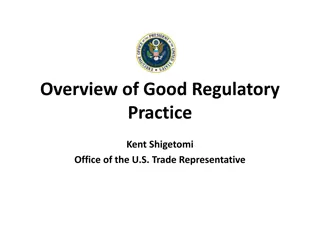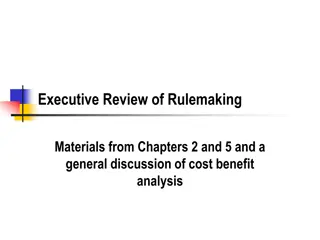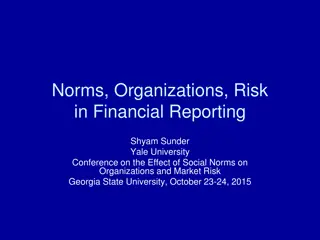Streamlining Business Licensing in Sarawak through Regulatory Experimentation
This initiative in Sarawak focuses on simplifying the business licensing process through regulatory experiments aimed at reducing regulatory burdens and improving the overall business ecosystem. By implementing innovative strategies such as risk-based approvals and composite licenses, the goal is to
0 views • 7 slides
Main Failures Faced by the Reserve Bank of India
The Reserve Bank of India has encountered several challenges including lack of adjustment in the money market, absence of uniformity in interest rates, inadequate bill market development, insufficiency of agricultural credit availability, lack of banking facilities in rural areas, and instability in
2 views • 11 slides
Update on Postbank System Failures and Challenges in Social Grant Payments
The presentation outlines the recent system failures experienced by Postbank, affecting social grant payments. Funds were deducted from accounts but not reverted after failed withdrawals. Postbank has corrected most accounts manually, but some beneficiaries may still need assistance. Challenges incl
0 views • 8 slides
Regulatory Update Highlights and Priorities for ONR NGO Forum 2023
The Regulatory Update presented by Mark Foy, Chief Executive, and Chief Nuclear Inspector at the ONR NGO Forum highlighted key areas of focus including ethics, future strategies, and regulatory advancements in the nuclear industry. The forum also featured insights from Donald Urquhart, Executive Dir
3 views • 26 slides
Understanding Over-Pressurized Filters in Jeep Reverse Plug and Kia/Hyundai Engine Recall
Learn about the risks of over-pressurized filters in Jeep Reverse Plug systems and the significant Kia/Hyundai engine recall affecting millions of vehicles due to potential engine failures. Explore the connection between oil pressure issues, engine machining errors, and the importance of using compa
3 views • 14 slides
Business Continuity Exercise Information and NHS England Emergency Preparedness
The content focuses on a business continuity exercise related to NHS England Emergency Preparedness, emphasizing the importance of evaluating and enhancing business continuity plans. It covers elements of business continuity management, exercise objectives, ground rules, scenario background, and res
3 views • 16 slides
Overview of Distributed Systems: Characteristics, Classification, Computation, Communication, and Fault Models
Characterizing Distributed Systems: Multiple autonomous computers with CPUs, memory, storage, and I/O paths, interconnected geographically, shared state, global invariants. Classifying Distributed Systems: Based on synchrony, communication medium, fault models like crash and Byzantine failures. Comp
9 views • 126 slides
Understanding Electromigration Effects in IC Interconnect Lines
Background: As IC circuits advance, preventing failures like electromigration is crucial. Vacancies lead to potential failures in metal interconnects by causing macroscopic voids and hillocks. Explore the governing equations and physics interfaces behind the migration of vacancies in IC circuits. Im
0 views • 14 slides
Overcoming Failures: A Christian Perspective on Dealing with Setbacks
Discover how Christians can navigate failures by seeking repentance, accepting consequences, and pressing forward with faith. Learn from biblical examples like Judas, Peter, and Paul to embrace growth through failure and never give up in the face of challenges.
0 views • 18 slides
Understanding System Reliability in Engineering
System Reliability in Science/Engineering involves understanding how products/systems work, as well as the ways they fail and the effects of failures. Reliability is the probability that a system will perform as expected under given conditions and play a crucial role in the design phase to mitigate
0 views • 19 slides
Developing an Effective Regulatory Experience Feedback Program for Safety: A Guide for Regulatory Bodies
This Safety Guide aims to assist regulatory bodies in managing regulatory experience by identifying sources, establishing means for information exchange, and implementing record-keeping processes. It addresses the need for cooperation and knowledge sharing among regulatory bodies to enhance safety s
1 views • 9 slides
Understanding Fault Diagnosis in Mechanical and Electrical Systems
Explore the essential methods and techniques for fault diagnosis in mechanical and electrical systems in industrial settings. Learn to identify different types of faults, utilize fault-finding aids, and rectify issues promptly to prevent future failures. Discover industry-recognized fault diagnosing
2 views • 27 slides
Understanding Electronic Centralized Aircraft Monitoring (ECAM) Systems
Electronic Centralized Aircraft Monitoring (ECAM) is a vital system that collects data from sensors throughout the aircraft, processes it, and displays key information to pilots efficiently. The system is composed of various components like System Data Acquisition Concentrators (SDACs), Flight Warni
0 views • 6 slides
Understanding Plane Failures in Rock Slopes
Plane failures in rock slopes are rare but significant, indicating sensitivity to changes in shear strength and groundwater conditions. Geometrical conditions must be met for such failures to occur, including specific alignments and interactions between the sliding plane and slope face. Analysis inv
0 views • 22 slides
Clear Criteria for Assessing Regulatory-Grade Real-World Data Sources
The discussion at the ISPOR Annual Meeting focused on defining regulatory-grade real-world data (RWD) sources as those of adequate quality for specific regulatory purposes. Panelists emphasized the importance of authenticity, transparency, accuracy, and track record in evaluating data quality. They
2 views • 5 slides
Understanding the Regulatory Environment: A Comprehensive Overview
This session delves into the regulatory landscape focusing on the objectives, types, and origins of regulations in the financial sector, particularly in Nigeria. It discusses the essential role of regulation in promoting compliance, protecting stakeholders, and maintaining operational integrity with
1 views • 42 slides
Understanding Wedge Failures in Geotechnical Engineering
Wedge failures in geotechnical engineering occur when slopes with discontinuities experience sliding along the line of intersection of two planes. This type of failure can happen under various geological and geometric conditions and involves specific criteria such as the dip of the intersecting plan
0 views • 13 slides
Understanding Regulatory Enzymes in Biochemical Pathways
Regulatory enzymes play a crucial role in controlling the activity of biochemical pathways by responding to the presence of specific molecules. They regulate the pathway's activity, ensuring that products are produced in the required amounts at different times. This article delves into the significa
5 views • 22 slides
Understanding and Managing Success and Failures: A Comprehensive Guide
Explore the contrasting lives of Ralph Lauren and Victor Green, highlighting the importance of managing both success and failures. Learn about overcoming fears, identifying root causes of emotions, enhancing self-esteem, stress management techniques, and efficient traits for managing success and fai
0 views • 12 slides
Importance of Software Testing in Preventing Catastrophic Failures
Software testing is crucial in ensuring the reliability and safety of software systems, as highlighted by catastrophic failures such as the Ariane 5 rocket incident and the Therac-25 radiation therapy machine disasters. These examples underscore the importance of thorough testing in identifying and
1 views • 42 slides
Handling Failures in RPC Systems: Strategies and Considerations
Exploring the challenges and strategies for handling failures in RPC systems, this lecture delves into potential issues such as client crashes, packet loss, server failures, and network slowdowns. The At-Least-Once scheme is discussed as a simple method for managing failures and ensuring data integr
2 views • 22 slides
Byzantine Failures and CAP Theorem Overview
Byzantine failures refer to arbitrary patterns of failures where nodes exhibit inconsistent behavior. This lecture discusses Byzantine agreement and the challenges in reaching consensus with faulty nodes. It explores the minimum number of processes needed for consensus and extends the concepts to ge
1 views • 32 slides
New Congestion Avoidance Methods for IP Networks
This research presentation highlights the challenges of IP network failures, focusing on planned and unplanned scenarios. Dr. Simon Tembo discusses innovative methods to prevent congestion during failures, including a backup topology design for unplanned failures and a congestion avoidance approach
2 views • 40 slides
Causes of the Great Depression: Economic Turmoil and Bank Failures
The Great Depression was characterized by an extraordinary reversal from prosperity to misery in the American economy. Factors such as a sharp decline in demand for goods, bank failures, and the Federal Reserve System's actions contributed to the crisis. The failure to prevent bank failures and the
0 views • 19 slides
Engine Component Failure Identification in Spring 2020 - Common Tests and Real-world Examples
In this presentation, students are tasked with connecting common engine performance test results with real-world component failures. The slides include images and descriptions of various failures such as blown head gasket, worn piston rings, burned valves, damaged cylinder walls, and more. The goal
0 views • 13 slides
Overview of Pipeline Safety Regulatory Updates
The Protecting our Infrastructure of Pipelines and Enhancing Safety Act of 2016 authorizes funding for PHMSA. Information on rulemakings can be found in DOT reports. The timeline for future rulemaking is pending on implementing Executive Orders. Enforcing the Regulatory Reform Agenda aims to allevia
1 views • 79 slides
Overview of FDA Office of Regulatory Affairs (ORA) and Office of Regulatory Science (ORS)
This information provides insights into the organizational structure and functions of the FDA Office of Regulatory Affairs (ORA) and the Office of Regulatory Science (ORS). It includes organizational charts, details about ORA laboratory locations, and the local structure of an ORA laboratory. Additi
1 views • 31 slides
Visual Insights into Schematic Failures and Bench Analysis
Explore detailed images showcasing schematic failures, analysis from schematics, web bench inputs, and re-compilation processes. Gain a deeper understanding of these visual representations in the context of technical failures and web bench activities.
0 views • 4 slides
Mitigation of Regulatory Capture in Economic Regulation
Regulation aims to correct market failures for societal welfare, but regulatory capture by interest groups can hinder regulatory actions. This work discusses economic theories on regulatory capture, forms of capture, and strategies to mitigate risks, emphasizing the public interest theory as a promo
0 views • 29 slides
Handling Errors and Failures in Software Design and Implementation
Exploring the concepts of dealing with errors and failures in software development, focusing on assertions and exceptions. Discusses the importance of preventing complete failures, giving information about problems, and preventing harm when things go wrong. Emphasizes the significance of structuring
0 views • 37 slides
Lessons from Winterbourne View Hospital: Failures in Patient Care
Winterbourne View Hospital exposed serious issues of neglect, abuse, and regulatory failures in patient care. The hospital ignored patient complaints, lacked accountability, and failed to address concerns raised by a whistleblower. Regulatory inspections were ineffective, and compliance with standar
0 views • 13 slides
Challenges and Considerations in Regulatory Cooperation and Competition
Protecting consumers and investors through effective regulation of accounting and corporate financial reporting is crucial. Regulatory cooperation offers benefits like simplifying the regulatory environment and enforcing best practices. However, regulatory competition can uncover limits and the adva
1 views • 39 slides
Understanding the Victorian Regulatory Change Measurement (RCM)
The Victorian Regulatory Change Measurement (RCM) methodology introduced in June 2010 aims to measure reductions in regulatory burden through different categories such as administrative costs, substantive compliance costs, delay costs, and more. The RCM formula helps in calculating the total regulat
0 views • 63 slides
National and EU Regulatory Frameworks for Training and Innovation Opportunities
Start/end date for WP5.1 initiative is M7-M24, led by CONFAGRI.PT and partners. The project aims to prepare the roll-out of deliverables at national and regional levels, focusing on regulatory frameworks, sustainability plan, and stakeholder engagement. Various organizations contribute to provide EU
0 views • 7 slides
Overview of Datacenter Operations and Failures
The content discusses datacenter organization, frequent failures, and the prevalence of datacenters in modern computing. It details the typical first-year failures in a new datacenter and highlights the number of servers per datacenter and the shift towards datacenter-centric computing.
0 views • 10 slides
Challenges and Solutions in Implementing Regulatory Impact Assessment in India
This article explores the adoption of Regulatory Impact Assessment (RIA) in India, discussing the political economy challenges and strategies to overcome roadblocks. It outlines the working definition of RIA, addresses potential opposition from politicians and bureaucrats, and suggests ways to gener
0 views • 7 slides
Understanding Good Regulatory Practice in Trade Governance
Good Regulatory Practice (GRP) is a key aspect of regulatory policy that focuses on improving the quality and cost-effectiveness of domestic regulations. It involves internationally recognized processes such as impact assessment, regulatory transparency, participation, and accountability. The import
0 views • 22 slides
Comprehensive Analysis of Rulemaking in Regulatory Governance
The executive review delves into regulatory materials from various chapters, highlighting both successes and failures within the regulatory landscape. It explores the tension in rulemaking, public perception of risk, and the role of non-agency regulation in tort and compensation law. The discussion
0 views • 44 slides
Addressing Accounting Failures and Abuses: Perspectives and Solutions
The content explores the issues of accounting failures, abuses, and potential solutions from short, medium, and long-term perspectives. It discusses the role of norms, organizations, and risks in financial reporting, as well as the need for reforms in auditing practices and regulatory oversight to m
0 views • 30 slides
Comprehensive Guide to Failure Mode and Effect Analysis (FMEA)
Failure Mode and Effect Analysis (FMEA) is a crucial process that identifies potential failures in products or processes, evaluates their impact, and proposes actions to prevent or mitigate these failures. FMEA aims to prevent problems, improve product development, ensure regulatory compliance, and
0 views • 34 slides
